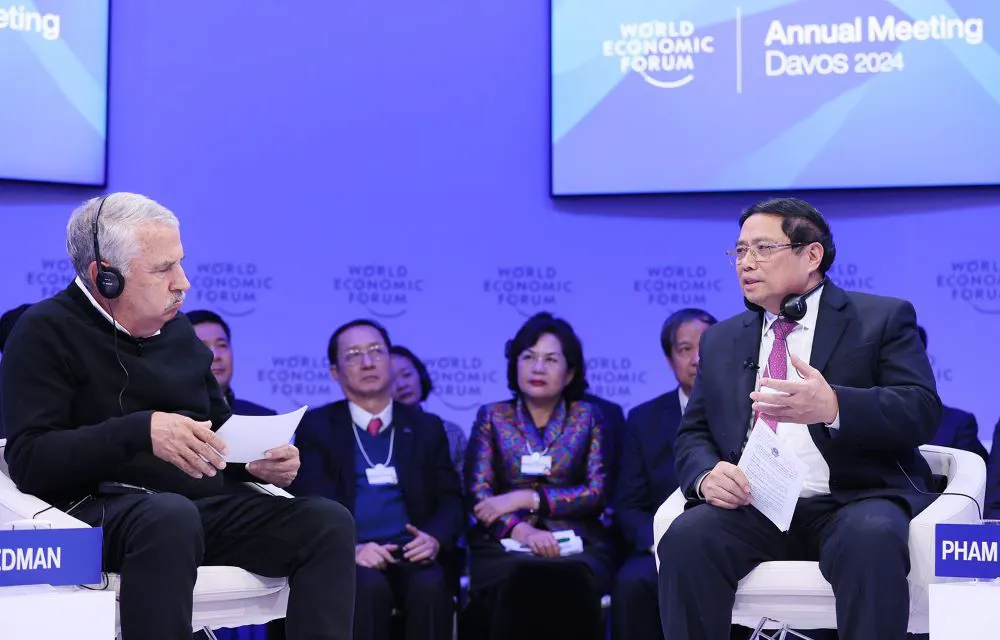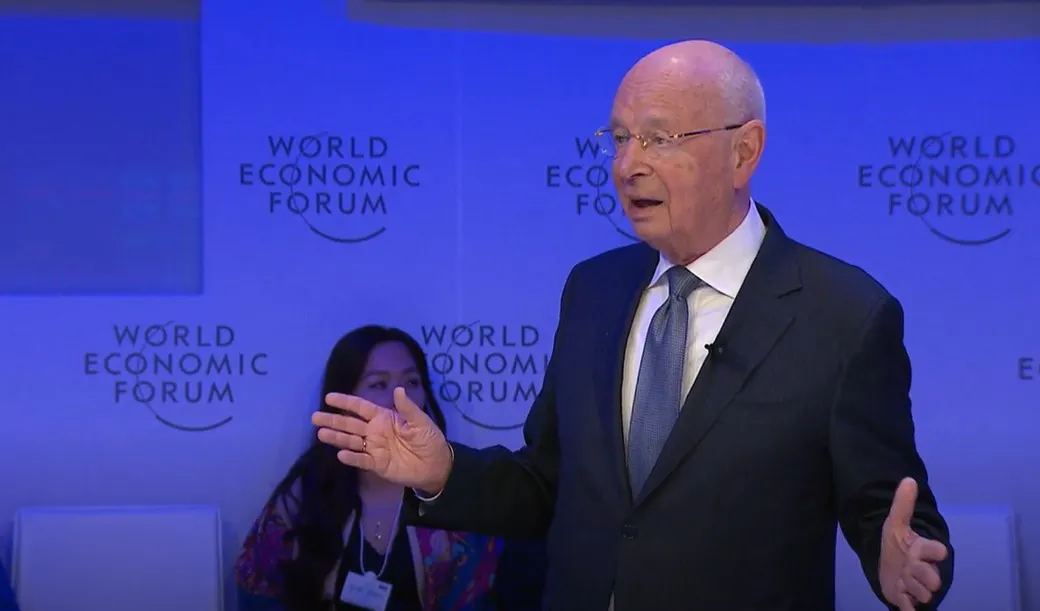Vietnam targets to draw investment in hi-tech industries: Prime Minister
Vietnam calls for investment in high technology while ensuring a better investment climate for investors, emphasizing institutional framework, infrastructure, and manpower.
Prime Minister Pham Minh Chinh affirmed at the World Economic Forum (WEF) that Vietnam has been pursuing the goal of investing in high-tech industries to one day become a technology powerhouse, as predicted by the world.
| Vietnam’s Prime Minister Pham Minh Chinh (R) and The New York Times columnist Thomas Friedman at a National Strategic Dialogue at the World Economic Forum (WEF) in Davos, Switzerland on January 16 (local time). Photo: Nhat Bac/VGP |
Prime Minister Chinh said at a National Strategic Dialogue held in Davos, Switzerland on January 16 (local time), introduced by WEF Founder and Chairman Klaus Schwab and moderated by The New York Times columnist Thomas Friedman.
In answering the question of how Vietnam is moving from cheaply assembling technology products to designing them, the Vietnamese Prime Minister spoke about the process in which the country had to seize the opportunities as a latecomer.
“We are the latecomer. We can enjoy the opportunities, take the lessons, and make use of the opportunities and minimize all the challenges and difficulties of being a latecomer,” Chinh said, adding that the Government is calling for investors in high technology industries.
He emphasized the principle of drawing investment by inviting foreign investors to set up research and development (R&D) centers in the country, which requires capacity building to produce high-quality products.
"At the same time, the Government of Vietnam creates favorable conditions for the investors to run businesses in the country. There is a combination of factors for a better investment environment, including the regulatory framework, infrastructure, and political determination," Chinh said.
Chinh cited Samsung and Foxconn as successful examples of doing business in the country. He mentioned the recent visits by Nvidia’s President and CEO Jensen Huang and said that the government would facilitate the corporation’s operations to make Vietnam the second home of Nvidia.
He also stressed the importance of trust and capacity building in producing quality products in various industries.
When asked about the development of artificial intelligence (AI), Chinh said that AI is a trend that Vietnam cannot ignore, but there are two sides to the coin, pros and cons, so the country needs to maximize the pros while minimizing the cons.
Specifically, the country needs to build a database and big data in the immediate future to form a national database system and center, considering it the most important thing. The second thing is infrastructure. The third one is the incentive policy. The next one is resources, with the important role of both private and public sectors. Another important factor is human resources focusing on education and training to have a skilled workforce.
| WEF Founder and Chairman Klaus Schwab at the dialogue. Screenshot from WEF video |
Vietnam’s experiences and direction
When asked about Vietnam’s development process which makes the country, both Klaus Schwab and Thomas Friedman said that the country has embraced reform policies and is transforming itself into a new powerhouse with a very forward-looking vision of creating a green and intelligent economy.
They stressed that Vietnam’s growth rates over the past years have positioned it as a star not only in East Asia but also globally. “Vietnam is in the process of becoming a very important partner in the global economy,” stated Klaus Schwab.
Meanwhile, Thomas Friedman said Vietnam began globalizing from low technologies with low-skilled jobs. Now, it’s moving to higher technology products that require skilled labor.
With such a development, which Friedman called “transformation”, Chinh said: “Our objective is to build a strong nation with the overall development of the people with middle income by 2030 and high income by 2050.”
To accomplish that goal, it’s necessary to maximize the strength of the country and bring to full play the unity and solidarity of the nation and the socialist-oriented market economy. In particular, Vietnam will not sacrifice social equity and environmental protection for the sake of economic growth.
Vietnam’s economy is based on self-reliance and substantial global integration with the shift to digital transformation, green, and circular economy.
On the development process over the past four decades since Doi moi (Renewal), the Prime Minister shared five important experiences, namely (1) maintaining independence in line with the socialist orientation; (2) the people who make history; (3) national unity; (4) combining the national strength with global movements; (5) the role of the Communist Party of Vietnam (CPV).
On a broader scale, he highlighted resources, saying resources come from mindset and seen momentum for growth. In the meantime, he stressed the role of international unity and multilateralism in addressing global issues, stating that this year’s “Rebuild Trust” theme is significant, requiring collective efforts for common issues, such as climate change. In addition, it must put people at the center of the development for their well-being.
Chinh also took stock of what is important for development, including the role of education; the need to develop a modern and industrialized nation; the importance of all industries as a whole that serve national growth objectives; and the priority list of green transition, AI, innovation, startup spirit, institutional framework, infrastructure, information technology, energy, unlocking potential, improving competitiveness, human resources – decisive factor, and the semiconductor industry which will need roughly 100,000 engineers in the future.
On climate change response, the Prime Minister said Vietnam suffers the most from climate change, especially in the Mekong Delta which is experiencing drought, sea level rise, salinization, flooding, and landside. The country has taken an active stance on the issue. It needs to come up with different solutions, navigating various initiatives, including growing one million hectares of low-emission rice to ensure food security for Vietnam and the world. At the same time, the country is building more forests and promoting carbon trading to reduce methane emissions from livestock.
Thomas Friedman mentioned Vietnam’s history of fighting wars against China and the US and now it’s good at balancing the relations with both. Prime Minister Chinh said that after World War II, the nation that suffered the most was Vietnam.
The country went through ups and downs after WW2 and fought against colonialism until it ended in 1954. The nation was then divided into two parts during the fight against neo-colonialism until 1975. “We are not forgetting the past - a part of the history that cannot be distorted, but we need to shelve the past and overcome differences to harness our similarities and look forward to the future,” stressed Chinh.
He said Vietnam can become a symbol of the spirit of overcoming war from former enemies to friends - a symbol of putting the past behind.











